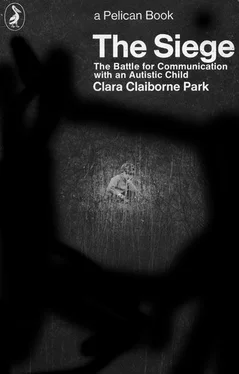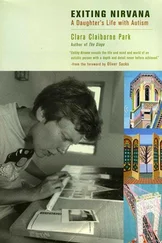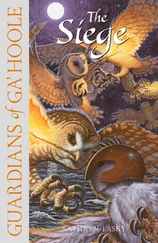I am going to interrupt the narrative at this point. Where Elly is today can best be communicated, not by summary and interpretation, but by presenting a few glimpses of her as she has appeared in action at different times in recent months. The reader will be able to make his own interpretations — among them, no doubt, some I have not thought of — and judge for himself how far Elly has come and how far there is still to go-
Elly is in her room playing with her dollhouse. Having picked up some of the scattered toys and books, I am sitting near her on the floor occupying myself with an interlocking gear toy. I am bored and quiescent. Elly is playing well, with little reference to me, but if I read she will find a way to bring my attention back and if I go away she will stop and follow me. I have learned that it works best to saturate her desire for community, to let her possess me completely for an hour or two; then when she has had all she can use she will be ready to do without me — for a little while.
Now she is perching all the little dolls in a row on the doll-house roof. She has a lot of them — the conventional family and many extras. She moves the hinged roof and they all fall down. She laughs with pleasure; clearly, that’s why she put them up there. I suggest, without emotion, that they are crying, are hurt. She laughs some more, says ‘Can’t ha’ supper on roof !’ I agree. She begins to imitate, in a high falsetto, the sound of dolls crying, with excited amusement. Noticing my gear arrangement, she has an idea: ‘Doll go merry-go-round, feel better.’ She puts them all on the merry-go-round, one per gear, and they stop crying, ‘Wan’ be happy, yes!’ says Elly. One doll begins to cry again. Elly puts her back on the roof, again to fall. ‘Poor girl,’ she says, laughing.
‘Ride-uh-boat?’ She neatly sits them all in her pull-toy ark, a game I suggested some two weeks before. I had, in fact, suggested that the boat take them to the A & P, since Elly had remarked that they had no car and could not go. But I’ve forgotten this, and so I ask if they are going to the island in the ferry. But of course they are going to the A & P. They will continue going there, and the dolls will continue falling off the roof; new ways to play do not come easy. Yet they come, bringing with them two questions which are perhaps only one: why do they come at all, or why do they not come more often?
A month later, Elly has another doll-house game. ‘ Walk to A & P, get a bo’ll wine, drink all up!’ She picks up a tiny bottle from the doll kitchen and, making as if to uncork it, produces with her curved tongue a perfect pop. We both laugh, I with surprise, she with pride. She has been praised for popping with her tongue, but this is the first time the trick has had meaning. She begins to offer wine to the dolls. In a cheery chirp she anticipates their reaction. ‘Baby “no thank you!” Grandma drink all up! Teacher drink all up! Boy “no thank you!.’ I ask, ‘Elly, do you want some wine?’ ‘Elly “no thank you!” ’
Elly’s dolls go to the hospital, they sit on the pot, they have parties. They do these things repetitively and in patterns, but still it is a pleasure to watch them. There are other ways of playing, equally cheerful for Elly but less so for the observer.
It is Saturday. ‘Nice day,’ says Elly. ‘Vacation day.’ With a gaiety that seems particularly relaxed and spontaneous she begins to play: she is arranging objects on a tray — a doll, a puppet, some National Wildlife stamps, a plastic Indian, a hairbrush, a catalogue, two books, six assorted doll-garments. Happily she lays them side by side, patting each. ‘And shoe-and cloth’ — she covers them with a red handkerchief. ‘Pretty.’
The arrangement is without meaning. The objects have no relationship in actuality. Fantasy would be hard put to it to provide one, and there is no sign of fantasy here. These are a set, in the mathematical sense, and Elly is pleased with it — the set of objects on this tray. At other times a rudimentary fantasy will give an arrangement an eerie social meaning, as when Elly sets out the letters on the scrabble board and informs us they are having a dinner party. Other games are even more discouraging. These we do not share. Daily Elly empties her toy-basket, pulls her books on to the floor, systematically dumps out every jigsaw puzzle in the house to sift the pieces through her fingers, as she sifts marbles, peanuts, even dolls. If I could always be playing with her, feeding her imagination and sustaining her attention, perhaps she would not play like that. But I cannot. Her play covers the whole range from utter sterility to the amusing surprises of the two incidents I described first. But such incidents, though increasingly frequent, are not typical. They exhibit the extreme of inventiveness and flexibility that Elly can as yet reach.
Play has its surprises, and (so far have we come) conversation has them too.
Elly says, ‘Elly three hundred!’
I say, ‘Three hundred is too old, Elly will die.’ (This is a concept that will bear some work, since it is so far based exclusively on squashed mosquitoes. )
Elly says cheerfully, ‘Too old, die,’ and mimes it. ‘Great big dead, too old! Carry me? Elly too tired? Elly three hundred, yes!’
Elly has been talking a good deal about dirt recently — dog dirt, doll dirt, our dirt. It means faeces. We have accepted this, particularly since her fuzzy pronunciation does much to denaturize the word in company. But her speech is improving and she is, after all, in school. I want her to learn, even if she cannot understand, that dirt is not an all-purpose conversational gambit. So I say, ‘I don’t want to talk about dirt.’ Yesterday at dinner I had said the same thing. Elly remembers — not only what I said but where and when. She makes a supreme effort to imagine what not wanting to talk about dirt might entail. We are not at dinner now, but for her the words are still embedded in their first context and it is in that context that she must envisage what I might regard as suitable conversation. She says triumphantly, ‘I [equals, of course, “you, mother”] want to talk about corn muffin!’
So slowly understanding grows, and even concern for others. ‘Becky eye pink . Need ointment.’ I recognize my own voice in the conventionalized tones of her concern. ‘Becky eye all better, Becky ha’ pink eye, yes! Don’t touch-uh-eye, make-uh- itch ! Leave eye alone, Becky. Feel better, yes. Becky eye all better, yes. She hurt . Ow! Ointment in it. See? All better. Sore eye. Becky get sad. See, Becky eye itch. Look. Becky cry? No!
Becky be happy! Becky sad? No! Becky put-uh-ointment in it.’
And gradually the forms of social interaction are refined. Coming in from my day at the college I greet her.
‘Hi, bird.’
‘Hi, bird,’ she echoes.
‘Say “hi, Mama .” ’ (On second thought) ‘Am I your bird?’
‘Yes.’
‘That’s all right, then you can say “bird” too.’
‘Hi, bird too.’
This is Elly in her own home, occasionally frustrated and anxious (if she has decided that the number of those dolls is significant, there will be hell to pay if she loses one), but in the main gay, active, full of cheerful noises and cheerful words. But if you were to watch her outside it you would see something very different. Outside, children play, familiar children who have lived long in the neighbourhood. No such conversations take place with them. They play in ways Elly does not share. They pull wagons, ride tricycles, run in and out of houses for toys and equipment, organize tea-parties, snow fights, and hide-and-seek. Elly swings and swings, or eats snow, or plays with sand as of old, dribbling it from a spoon. I can get her to make cakes, but why should another child make the effort, or accommodate itself to her rigidities? ‘You want to put icing on it, Elly?’ Anxiously Elly replies ‘No?’
Читать дальше












